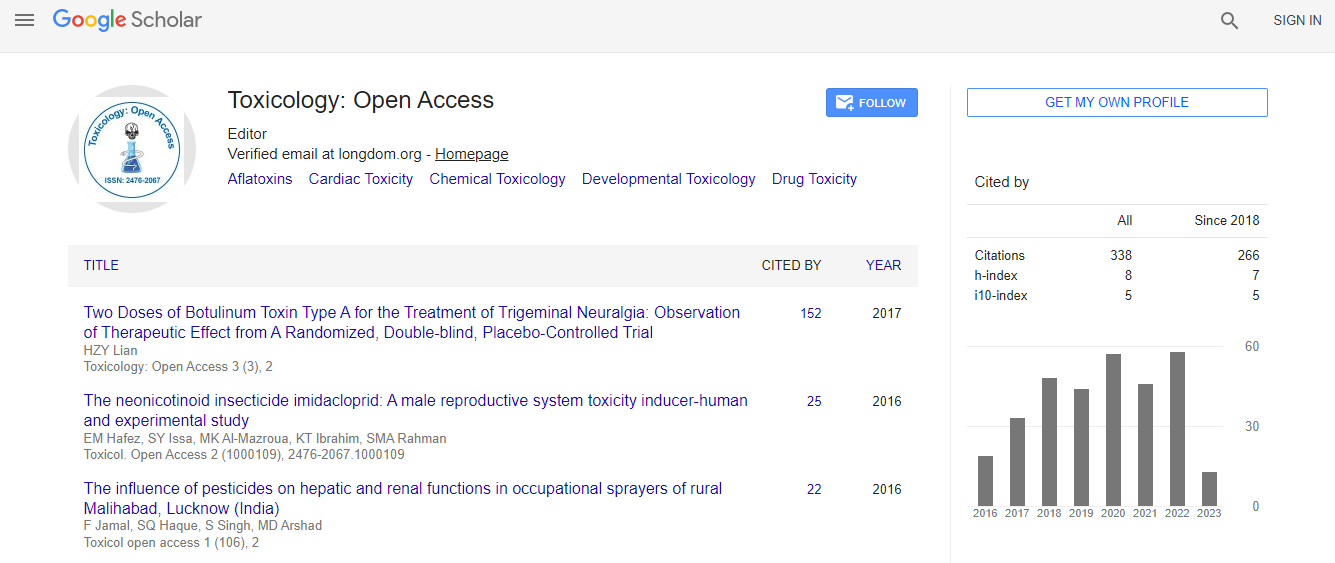Our Group organises 3000+ Global Conferenceseries Events every year across USA, Europe & Asia with support from 1000 more scientific Societies and Publishes 700+ Open Access Journals which contains over 50000 eminent personalities, reputed scientists as editorial board members.
Open Access Journals gaining more Readers and Citations
700 Journals and 15,000,000 Readers Each Journal is getting 25,000+ Readers
Google Scholar citation report
Citations : 336
Toxicology: Open Access received 336 citations as per Google Scholar report
Indexed In
- Google Scholar
- RefSeek
- Hamdard University
- EBSCO A-Z
- Geneva Foundation for Medical Education and Research
- Euro Pub
- ICMJE
Useful Links
Related Subjects
Share This Page
Polyphenol resveratrol triggers Cisplatin-resistant human oral cancer CAR cell autophagy and apoptosis
8th World Congress on Toxicology and Pharmacology
Chi-Cheng Lu, Chao-Hsiang Chang and Jai-Sing Yang
China Medical University, Taiwan
Posters & Accepted Abstracts: Toxicol Open Access
Abstract
Resveratrol is known to be an effective chemopreventive agent against multiple tumor cells, but the increasing drug resistance avoids the cancer treatment in oral cavity cancer. In the current study, we investigated the oral anti-tumor activity of resveratrol and its underlying mechanism in Cisplatin-resistant oral cancer CAR cells. Our results demonstrated that resveratrol provoked autophagic cell death to form AVOs and autophagic vacuoles in CAR cells by acridine orange (AO) and monodansylcadaverine (MDC) staining. Inhibitors of PI3K class III (3-MA) and AMP-activated protein kinase (AMPK) (compound c) suppressed the autophagic vesicle formation, LC3-II protein levels and autophagy induced by resveratrol. Z-VAD-FMK (pan-caspase inhibitor) attenuated resveratrol-triggered cleaved caspase-9, cleaved caspase-3 and cell apoptosis. Resveratrol also enhanced phosphorylation of AMPK and regulated autophagy- and pro-apoptosis-related signals in resveratrol-treated CAR cells. Our results indicated that resveratrol is likely to induce autophagic and apoptotic death in drugresistant oral cancer cells and might become a new approach for oral cancer treatment in the near future.Biography
Chi-Cheng Lu completed his Graduation and Doctorate from National Chung Hsing University (NCHU), Taichung, Taiwan. He worked at the Department of Food Science and Biotechnology of NCHU as a Post-doctoral Fellow under Chair Professor Gow-Chin Yen. He then worked with Research Fellow Dr Jai-Sing Yang of China Medical University Hospital (Taiwan) as a Post-doctoral Research and Project Scientist. His specific interests are focused on targeting tumor cell demise (apoptosis, autophagy and necrosis) and anti-metastatic effect in vitro and in vivo after exposure to phytochemicals and the synthesis of novel compounds. He has also undertaken oxidative stress and functional food research in recent years and is exploring their molecular mechanisms.
Email: a722353@gmail.com

 Spanish
Spanish  Chinese
Chinese  Russian
Russian  German
German  French
French  Japanese
Japanese  Portuguese
Portuguese  Hindi
Hindi 